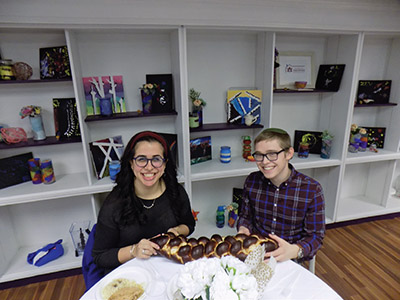


His voice becomes increasingly more confident as he reads the words of Sheva Brachot from the bencher. Naftali Stubin finishes the bracha and sits up straight, looking toward me and Netanel in awe, seemingly surprised at himself.
His eyes open wide and his lips curl into a grin as he exclaims,
“That was the first time I ever was asked to say one of the Sheva Brachot!”
At that moment I peered at my new husband and looked at all the participants of the Mendel Balk Yachad Adult Community Center while they sat around, eager to continue the excitement. And I knew that Yachad was exactly where I wanted to celebrate the last night of our sheva brachot.
At the beginning of the night, Netanel and I had come into the vibrantly decorated Yachad Center and separated into our designated dancing circles. I held my hands out to girls, whom I spend many nights a week with at the center. Each of them was genuinely beaming back at me. I danced to the melodious tunes of a simcha with pure happiness, which seemed to fill my entire being.
After the majority of the festivities had passed, and we found ourselves answering Amen to Naftali’s bracha, I noticed that on the table in front of us was a wedding card enveloped in white. Corinne Blyumin, a participant for whom I have grown to care deeply throughout our time at the center together, had quietly placed the card in front of us. We looked up from reading the beautiful card to find Corinne smiling so infectiously.
Later in the evening, Avi Tsadok, a participant who stood tall with confidence, opened up a folded piece of paper as he spoke to a room full of listeners. Avi spoke of his relationship with Netanel and me. His best wishes and thoughtful words left me feeling proud. Proud of the strong bond that Avi and all the other Yachad members so obviously feel toward us as they danced and sang together.
And I thought, “If this is not inclusion, I don’t know what is.”
Inclusion because I wanted Naftali to recite the bracha just as much as he wanted to participate.
Inclusion because I had felt that I needed to dance with Corinne at my wedding, a week before, but because she could not attend, I pushed for a sheva brachot at the Yachad Center in order to dance with her now.
And inclusion because these were people whom Netanel and I wanted to celebrate with, just as much as anyone else in our lives. Disability or not, it was irrelevant because they are our friends.
This sheva brachot was something I didn’t just want to happen, but rather I needed to happen. I remember thinking, a few weeks before my wedding, that having a sheva brachot at the Yachad Center would be a fantastic idea. The idea turned into a necessity I could not stop pestering my colleagues about.
Is it going to happen? Who will make it happen?
The questions piled up along with all the other pressures that come with getting married in just a few weeks.
But why was having this sheva brachot so important to me?
My need for this event to occur is actually as personal as it gets. My own 12-year-old brother, who has Down syndrome, lives in an inclusive world, a world where Yachad’s mantra echoes everywhere—in my family’s home, in my brother’s school, in his entire community. Because everyone belongs. A world where someone like my brother is not labeled or pitied, but rather seen as equal. Equal in that you can dance with me at my simcha, no matter what kind of challenge you have. You can speak at my simcha, no matter if you have autism, Down syndrome or any other disability. In my mind, we are all human beings who deserve to be full participants in the world around us.
And so it actually startled me when Naftali said this was his first time ever participating in a sheva brachot. It opened my eyes to the unique opportunity that having my sheva brachot at the Yachad Center gave to each member. And while Netanel and I sat at our table looking at all the people we hang out with on a daily basis, the realization hit: this needs to be the future of our lives.
Not just mine, because I have a sibling who has a disability. And not just Netanel’s because he now has a brother-in-law who has a disability. But this needs to become the norm for everyone. Because people are people and have so many other pieces to their puzzle of their human existence besides their disabilities. Each of us should live as equals amongst each other with Yachad’s mantra humming through the sounds of our daily lives, because everyone belongs.
We all deserve to celebrate not only this simcha together but all smachot together—as we celebrate life itself b’yachad.
By Arielle Zellis Paley











